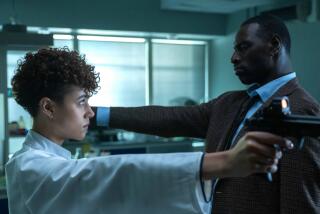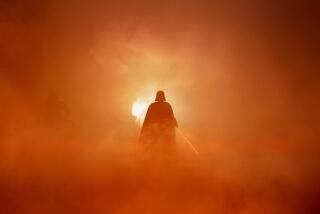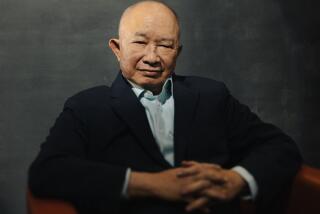Ancient hero, modern epic
- Share via
BEIJING — Zhang Yimou’s “Hero” premiered here last weekend, marking the first foray by mainland China’s leading director into epic martial arts dramas, a genre Hong Kong has dominated for more than three decades.
With an all-star Chinese cast headlined by Jet Li, the film is an impressive blend of art-house aesthetics and aerial kung fu dogfights with ambitions of attracting a mass global audience. The film also is building high expectations in the post-”Crouching Tiger, Hidden Dragon” cinema.
Zhang has downplayed any aspirations for an Oscar, but the film is China’s submission for a best foreign-language film award. It will hit the international festival circuit, and Miramax is distributing it in the United States.
“I simply wanted to make a movie that was fun to watch,” Zhang said at a news conference before the film’s extravagant opening, at which Chinese politicos were treated to a screening at the cavernous Great Hall of the People, the scene of last month’s 16th Communist Party Congress.
Chinese and foreign media have lavished attention on the details of the film’s production, its $30-million budget (the biggest for a Chinese film), its formidable publicity offensive and the intense security measures aimed at thwarting would-be video pirates.
Like fellow director Chen Kaige’s “Assassin,” which premiered in the Great Hall three years ago, the story line of Zhang’s “Hero” is a variant on an historical event during the 2nd century BC: the attempted assassination of Qin Shihuang, the first emperor to rule a united China.
For killing off three potential assassins, the emperor rewards a local constable, played by Li, with an audience and a chance to recount how he bested the trio of expert swordsmen. But the account comes under suspicion, along with the constable’s loyalties.
Competing narratives follow, each with a different color scheme and alternate characterizations for the story’s main figures.
The color-coded cataclysms of black arrows, white brushes, brown bamboo scrolls, red leaves and green drapes are Zhang’s signature touch, reminiscent of the richly dyed cloths in “Ju Dou” or the hanging clusters of corn and chili peppers in “The Story of Qui Ju.”
In contrast with the lengthy, static compositions of Zhang’s earlier films, the strength of “Hero” lies in the visual and sonic impact of its action. The cruise missile-like flight of the Qin army’s hail of arrows and the gravel-spraying hoofs of its cavalry pack the punch of a modern war movie.
The backdrops include China’s most spectacular natural scenery, including the desert canyons of Dunhuang and the azure lakes of Jiuzhaigou.
Yet some critics and viewers have not found the film original in its themes or convincing in some of its portrayals.
“In the end, we all understand the emperor and understanding the emperor means peace. What kind of logic is that?” asked Chinese Academy of Social Sciences film expert Chen Xiaoming in an article in the Beijing Daily.
In interviews before the premiere, two principal actors said they had agreed to the project out of admiration for Zhang. But they confided that the film turned out differently from what they had imagined, and that they had expected it to be more realistic and complex.
The film’s ideal of the romantic but lethal peacenik is embodied in Broken Sword, the assassin played by Tony Leung and his equally lethal lover, Snow, played by Maggie Cheung. The convictions of Leung’s character radiate from his wounded smile, and the chemistry between him and Cheung, which fueled Hong Kong director Wong Kar-wai’s “In the Mood for Love,” still smolders.
But when Leung uses his calligraphic brushwork to demonstrate to the constable and the emperor that the highest level of martial skill is to transcend technique and violence, the results are less than compelling.
“Hero” is the first movie in years in which former martial arts athlete Li has spoken in his native language, and he shows an unprecedented maturity. But the narrow range of expression that filters through his stony visage offers little clue of his conversion to Leung’s cause.
While the pacifists clearly move the emperor, their moral suasion and sacrifices still seem lost on him. We can imagine a twinge of regret flickering across his face before he commits the greatest act of censorship in Chinese history: burning all of the country’s books and burying its scholars alive.
The totalitarian rule of China’s first emperor has been debated, cursed and emulated for centuries. Zhang admits that he did not tackle some difficult issues head-on. “I had no intention of assessing Qin Shihuang’s place in history,” he said in an interview. “Movies can’t resolve this question. We’re just telling a story.”
Many of the themes explored in “Hero” have been treated more successfully elsewhere.
Zhang started planning the film before “Crouching Tiger” had great success, but the bad timing, which may force comparison to Ang Lee’s work, does not work in favor of “Hero.” Technically, the film is in a slightly different genre from “Crouching Tiger.” Chinese film experts distinguish the wuxia or swordplay flicks of the 1960s from the wuda or kung fu pictures of the 1970s.
“Hero” martial arts choreographer Tony Ching focuses on the aesthetics of combat rather than the techniques, and prides himself on his ability to make nonmartial arts actors (such as Zhang Ziyi of “Crouching Tiger” fame, as well as Leung and Cheung) look like adepts. His style contrasts with “old school” masters such as “Crouching Tiger” choreographer Yuen Wo-ping, who try to bring out the natural beauty in martial technique itself.
The combat in “Hero” is all with weapons, much of it airborne wire work, and largely unoriginal. Only the duel between Li and veteran martial artist Donnie Yen delivers the electricity of a face-off between highly skilled combatants.
As for martial arts movies, “no matter how you make them, it’s all been done before,” said Li, who says he is too busy to practice martial arts these days.
“It’s hard to explain the martial artists’ code of chivalry, especially to foreigners,” Zhang said. “I’d say it is one of man’s spiritual realms. I wanted to make the martial arts action subordinate to the chivalrous conduct.”
Leung said that like Zhang, he grew up reading the martial arts novels of Hong Kong’s Jin Yong and Taiwan’s Gu Long, but that people’s conceptions of that fictional world can be very different.
“Hero” is likely to be among Zhang’s least controversial films. His earlier works -- “Ju Dou,” “Raise the Red Lantern,” and the Cannes Palme D’Or prize-winning “To Live” -- have been or are still banned for their political content. Zhang’s films have been criticized sometimes for pandering to foreign tastes, sometimes for parroting government propaganda.
The crew of “Hero” reflects Zhang’s growing prominence in the international film industry.
Chinese composer Tan Dun, who, along with cellist Yo-Yo Ma, created the music for “Crouching Tiger,” composed the music. Tan invited violinist Yitzhak Perlman to perform some of the pieces with a violin outfitted with silk strings to sound like an ancient Chinese instrument.
From Japan, Zhang employed Emi Wada, former costume designer for one of Zhang’s favorite directors, Akira Kurosawa, and the powerful rhythms of the Taiko drummers.
Zhang also teamed up with Mandarin-speaking Australian cinematographer Chris Doyle, who has contributed to the visual richness of many of Zhang’s films.
More to Read
Only good movies
Get the Indie Focus newsletter, Mark Olsen's weekly guide to the world of cinema.
You may occasionally receive promotional content from the Los Angeles Times.








